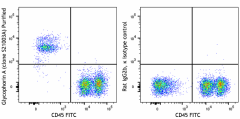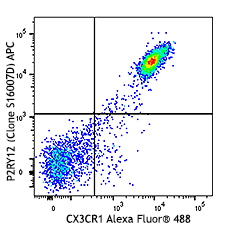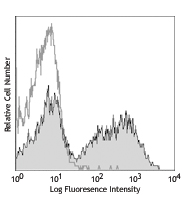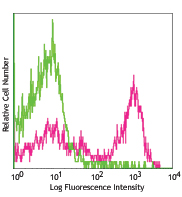- Clone
- S21003A (See other available formats)
- Regulatory Status
- RUO
- Other Names
- GPA, CD235a, GYPA, Sialoglycoprotein alpha, MN sialoglycoprotein, PAS-2, Monoclonal antibody to mouse Glycophorin A (GYPA / CD235a)
- Isotype
- Rat IgG2b, κ
- Ave. Rating
- Submit a Review
- Product Citations
- publications

-

C57BL/6 mouse bone marrow cells were stained with anti-mouse CD45 FITC and purified anti-mouse CD235a (Glycophorin A) (clone S21003A) (left) or purified rat IgG2b, κ isotype control (right), followed by APC goat anti-rat IgG. Data shown was gated on RBCs and lymphoid together. -

C57BL/6 frozen mouse spleen section was fixed with 4% paraformaldehyde (PFA) for ten minutes at room temperature and blocked with 5% FBS for 30 minutes at room temperature. Then the section was stained with 10 µg/mL of purified anti-mouse CD235a (Glycophorin A) (clone S21003A) overnight at 4°C, followed by 2.5 µg/mL of Alexa Fluor® 594 anti-rat IgG2b (red), 5 µg/mL of Alexa Fluor® 647 anti-mouse/human CD45R/B220 (blue), and Alexa Fluor® 488 anti-mouse CD3ε (green) (left) or Alexa Fluor® 488 anti-mouse F4/80 (green) (right) for two hours at room temperature. The images were captured by 10X objective. -

C57BL/6 frozen mouse submandibular gland section was fixed with 4% paraformaldehyde (PFA) for ten minutes at room temperature and blocked with 5% FBS for 30 minutes at room temperature. Then the section was stained with 10 µg/mL of purified anti-mouse CD235a (Glycophorin A) (clone S21003A) (left) or 5% FBS only (right) overnight at 4°C, followed by 2.5 µg/mL of Alexa Fluor® 594 anti-rat IgG2b (red) for two hours at room temperature. Nuclei were counterstained with DAPI (blue). The images were captured by 10X objective.
| Cat # | Size | Price | Quantity Check Availability | Save | ||
|---|---|---|---|---|---|---|
| 116702 | 100 µg | 254€ | ||||
CD235a, also known as Glycophorin A (Gypa) is a type I transmembrane sialoglycoprotein that is expressed on mouse erythrocytes, erythroid precursor cells and certain leukemic cells. Glycophorin A has been proposed to be involved in translocation of SLC4A1 to the plasma membrane. Glycophorin A may also be involved in regulation of response to osmotic stress.
Product DetailsProduct Details
- Verified Reactivity
- Mouse
- Antibody Type
- Monoclonal
- Host Species
- Rat
- Immunogen
- Mouse Glycophorin A-transfectant cells
- Formulation
- Phosphate-buffered solution, pH 7.2, containing 0.09% sodium azide
- Preparation
- The antibody was purified by affinity chromatography.
- Concentration
- 0.5 mg/mL
- Storage & Handling
- The antibody solution should be stored undiluted between 2°C and 8°C.
- Application
-
FC - Quality tested
IHC-F - Verified - Recommended Usage
-
Each lot of this antibody is quality control tested by immunofluorescent staining with flow cytometric analysis. For flow cytometric staining, the suggested use of this reagent is ≤ 0.06 µg per million cells in 100 µL volume. For immunohistochemistry on frozen tissue sections, a concentration range of 5.0 - 10.0 µg/mL is suggested. It is recommended that the reagent be titrated for optimal performance for each application.
- Application Notes
-
Clone S21003A does not block the binging of clone Ter-119 to target cells.
Clone S21003A could induce RBCs aggregation at high concentration.
Clone S21003A reacts with mouse CD235a (Glycophorin A). - Product Citations
-
- RRID
-
AB_2924454 (BioLegend Cat. No. 116702)
Antigen Details
- Structure
- CD235a is type I transmembrane sialoglycoprotein
- Distribution
-
Expressed on mouse erythrocytes, erythroid precursor cells and certain leukemic cells
- Function
- Regulation of response to osmotic stress. May be involved in translocation of SLC4A1 to the plasma membrane
- Cell Type
- Erythrocytes
- Biology Area
- Cell Adhesion, Cell Biology, Immunology
- Molecular Family
- Adhesion Molecules, CD Molecules
- Antigen References
-
- Arimitsu N, et al. 2003. Genes Cells. 8:769-777-77.
- Devin RB, et al. 2016. Proc Natl Acad Sci USA. 113:5245-50.
- Gene ID
- 14934 View all products for this Gene ID
- UniProt
- View information about CD235a on UniProt.org
Related Pages & Pathways
Pages
Related FAQs
Other Formats
View All CD235a Reagents Request Custom Conjugation| Description | Clone | Applications |
|---|---|---|
| Purified anti-mouse CD235a (Glycophorin A) | S21003A | FC,IHC-F |
| APC anti-mouse CD235a (Glycophorin A) | S21003A | FC |
| PE anti-mouse CD235a (Glycophorin A) | S21003A | FC |
Customers Also Purchased
Compare Data Across All Formats
This data display is provided for general comparisons between formats.
Your actual data may vary due to variations in samples, target cells, instruments and their settings, staining conditions, and other factors.
If you need assistance with selecting the best format contact our expert technical support team.
-
Purified anti-mouse CD235a (Glycophorin A)

C57BL/6 mouse bone marrow cells were stained with anti-mouse... 
C57BL/6 frozen mouse spleen section was fixed with 4% parafo... 
C57BL/6 frozen mouse submandibular gland section was fixed w... -
APC anti-mouse CD235a (Glycophorin A)

C57BL/6 mouse bone marrow cells were stained with anti-mouse... -
PE anti-mouse CD235a (Glycophorin A)

C57BL/6 mouse bone marrow cells were stained with anti-mouse...
 Login / Register
Login / Register 












Follow Us